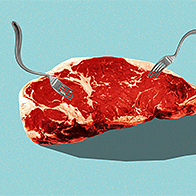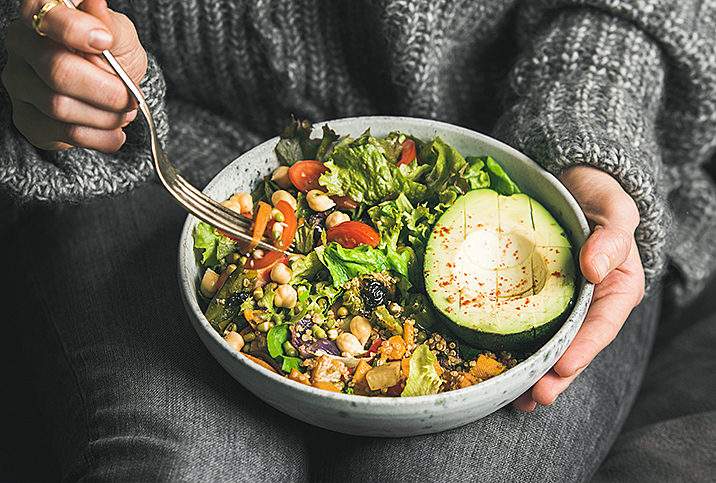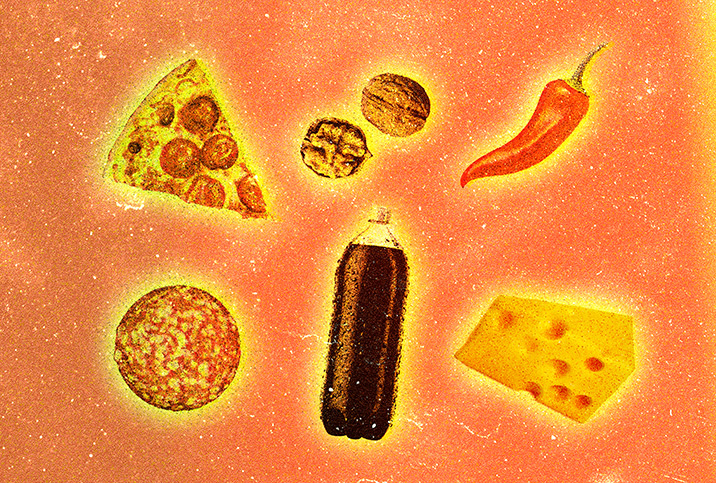A Plant-Based Diet Is Palatable to Your Prostate

The World Health Organization (WHO) can really put a damper on a picnic. When you're wolfing down hot dogs, sausages and other tasty processed meats, try not to think about the WHO's classification of these treats as known carcinogens.
Tobacco, asbestos…hot dogs. They're all Group 1 carcinogens in the WHO's book, meaning convincing evidence suggests they cause cancer in humans. Red meats such as beef, pork and lamb are Group 2A carcinogens, meaning they "probably" cause cancer.
What's a red-blooded, meat-eating person supposed to do? The answer is the antithesis of a meat-heavy diet: a plant-based diet. This type of diet has long been known to provide multiple health benefits, and now, two recent studies identify a beneficial association specifically for men's prostate health.
The separate studies looked at plant-based diets and their impact on prostate cancer risk and prostate-specific antigen (PSA) levels. PSA is a protein produced by both cancerous and noncancerous cells in the prostate gland, and elevated PSA levels are a possible indicator of the presence of prostate cancer.
Researchers concluded that increased consumption of healthful plant-based foods may be associated with a lower risk of prostate cancer overall and a lower risk of fatal cases among men younger than age 65, as well as a lower risk of elevated PSA levels.
The results were presented in September 2021, during an American Urological Association virtual press session moderated by Stacy Loeb, M.D., a professor of urology and population health at New York University and the Manhattan Veterans Affairs Hospital. She specializes in prostate cancer and men's health.
"I think there are so many men who are very concerned about sexual health and about prostate cancer, and people want to know, 'What can I do?'" Loeb said in a phone interview. "This is not some kind of risky drug—this is eating healthy plant-based foods, which is something we already recommend for cardiovascular health."
Plant-based foods and prostate cancer
In previous studies, meat and dairy products have been shown to be potentially linked with a greater risk of significant prostate cancer, while individual foods, such as tomatoes and cruciferous vegetables, have been considered "protective" against prostate cancer, said Loeb, a co-author of the study on prostate cancer risk.
The new studies explored plant-based dietary patterns as a whole, and found the more healthful plant-based foods you eat, the more you reduce your chance of getting aggressive prostate cancer.
"Particularly in the younger men, we found a really dramatic and statistically significant lower risk of advanced prostate cancer, lethal prostate cancer and fatal prostate cancer with greater consumption of healthful plant-based foods," she said during the press conference, adding that these findings were particularly strong for men younger than age 65.
A plant-based diet has an apparent protective effect against prostate cancer, said Ali Mouzannar, M.D., a urology resident at the University of Miami Miller School of Medicine and one of the authors of the study on PSA levels.
Increased consumption of healthful plant-based foods may be associated with a lower risk of prostate cancer overall and a lower risk of fatal cases among men younger than age 65.
"We still need more insight and clinical trials to establish a causative effect, but there have been multiple associations between lower risk of prostate cancer, lower risk of having elevated PSA and a plant-based diet," he said during the press conference. "And it's also the other way around: Meat has been shown to be associated with higher risk of aggressive prostate cancer, higher risk of recurrence if you have one [case], and they do poorly, basically, if they continue to eat meat."
The prostate cancer study examined data from more than 47,000 men who were followed for up to 28 years in the Health Professionals Follow-up Study. Plant-based dietary indices were calculated using responses from a Food Frequency Questionnaire collected every four years.
A distinction was made between an overall plant-based diet index (PDI) and a healthful plant-based diet (hPDI). Healthful plant-based foods include whole grains, fruits, vegetables, nuts, legumes, beans, tea and coffee. Less healthy plant-based foods include fruit juices, refined grains, potatoes, sweets and desserts, and sugar-sweetened or artificially sweetened beverages. Higher consumption of plant-based foods equals higher hPDI and PDI scores.
Among men younger than 65 at the time of diagnosis, an increased overall intake of plant-based foods was associated with a lower risk of advanced prostate cancer, and eating more healthful plant-based foods was associated with lower risks of total and fatal prostate cancers, researchers reported.
There were no associations between either the overall or healthful plant-based diet indices and prostate cancer among men older than 65.
Plant-based foods and PSA levels
Prostate-specific antigen plays a critical role in screening, detecting and surveilling prostate cancer, Mouzannar said. Lifestyle changes, including diet modification, are often implemented to mitigate PSA levels.
In the PSA study, researchers reviewed data on demographics, diet and PSA levels among men enrolled in the National Health and Nutrition Examination Survey from 2003 to 2006. Again, plant-based and healthful plant-based dietary indices were created based on food consumption surveys.
The conclusion: People who consumed the highest amount of healthful plant-based foods were less likely to have an elevated PSA level, Loeb said.
The use of plant-based foods in your diet
Sunni Patel, a culinary medicine coach and founder of the London-based Dish Dash Deets health platform, is a believer in the plant-based diet.
"Generally speaking, I do advocate and believe in the growing evidence suggesting the power that a plant-based diet can play on overall health, health years, as well as cancer risk," Patel said in an email. "Whole-food plant-based diets are low in saturated fat [and] high in fiber, antioxidants and anti-cancer phytonutrients that can play a positive role in reducing risk and possibly preventing chronic and life-threatening illnesses like cancer."
Compelling research provides validity for the role of dietary intervention to manage PSA levels, he added.
"Changes in rate of PSA rise, an indicator of disease progression, have been shown to reverse or slow down with the intake of plant-based food groups, suggesting that those with prostate cancers may respond quickly to short-term changes in diet," he said.
Patel said growing evidence also suggests that increasing whole grains and vegetables in your diet may influence the course of prostate cancer after diagnosis, prolonging survival and causing remission of bone and visceral metastases in men with advanced prostate cancer.
While the two new studies concluded "more is better" for plant consumption, some is better than none, said Bonnie Taub-Dix, RDN, creator of betterthandieting.com and author of "Read It Before You Eat It: Taking You From Label to Table."
"Many studies have shown that letting plants play a starring role on your plate, with animal proteins playing a supporting role, helps to support good health and longevity," she said in an email.
"I don't necessarily recommend that anyone goes 'all in' if they are barely consuming a whole grain or veggie in general," she continued. "But trying to pick plants at least several days a week could bring big benefits, including a better sense of well-being, and depending on how you eat/cook your plants, you could lose weight, as well."
Plants top the list of foods that have been shown to reduce the incidence of prostate cancer, Taub-Dix said. For example, tomatoes are rich in lycopene, a powerful antioxidant that may prevent prostate cancer, especially when the tomatoes are cooked (as in canned tomatoes) and combined with a little oil. Lycopene is also found in fruits such as watermelon, pink grapefruit, guava and papaya.
Other beneficial foods include cruciferous vegetables, such as cauliflower, cabbage, broccoli and Brussels sprouts, and pulses, including chickpeas, lentils and kidney beans, she added.
Practical applications of the studies
Mouzannar said clinicians could incorporate the studies' findings into a shared decision-making process with their patients to promote healthier lifestyle choices. He sees many patients who want to know how they can lower their PSA level, decrease prostate cancer risk and avoid a prostate biopsy. The PSA study suggests a plant-based diet can potentially reduce the likelihood of prostate biopsy and any associated treatment morbidity, he said.
Loeb said the results of the PSA study are vital for the prevention of prostate cancer.
"Having an elevated PSA can cause a lot of anxiety for people, and the next step involves additional tests, which can include imaging tests, marker tests and, ultimately, a biopsy to check for prostate cancer," she said. "I think prevention is very important. We want to prevent prostate cancer from developing in the first place and, most importantly, we want to prevent aggressive cancer."




















